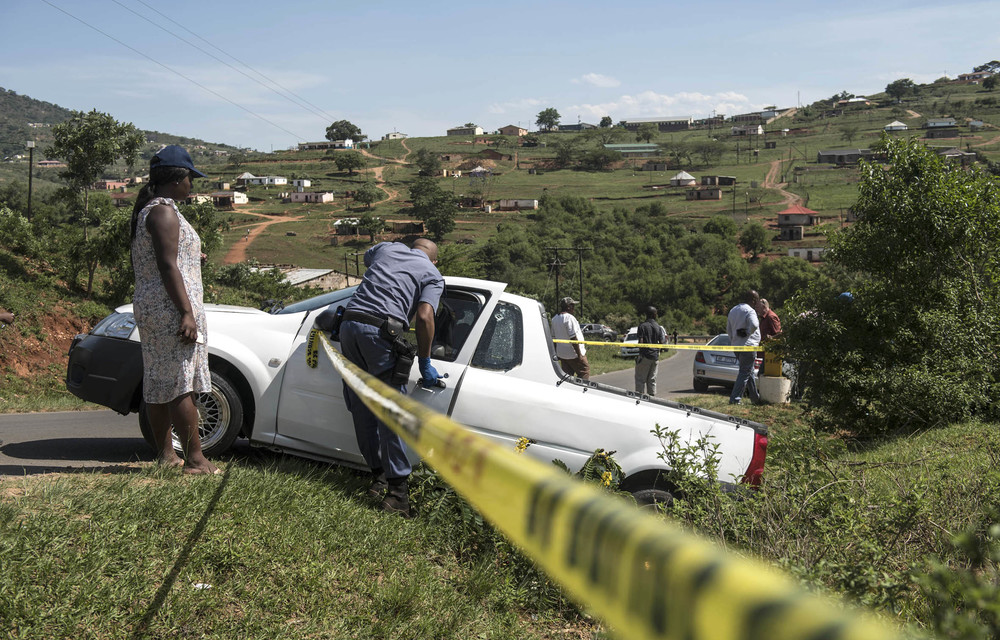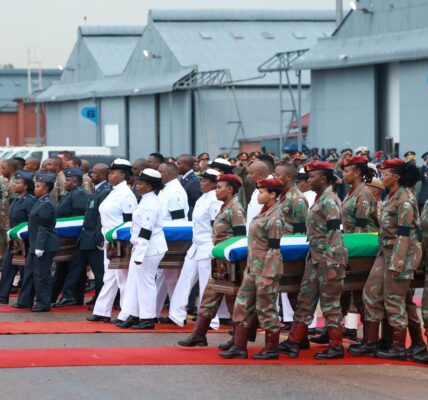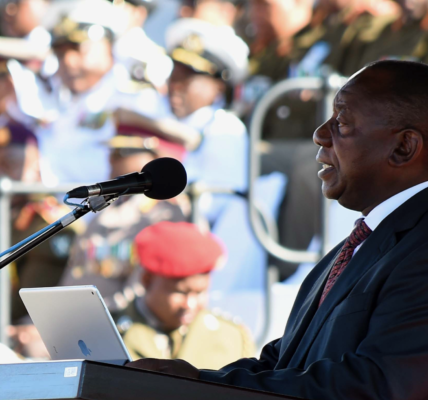South Africa Records One Political Hit Every Two Weeks Ahead of National Elections – Chwayita Thobela, Gi-TOC

In the lead-up to South Africa’s national elections on May 29, an average of at least one politically motivated assassination occurred every two weeks between January and April 2024. This alarming trend is detailed in a new report, The Politics of Murder: Criminal Governance and Targeted Killings in South Africa, by the Global Initiative Against Transnational Organized Crime (Gi-TOC). One of the report’s authors, Chwayita Thobela, discussed in an interview with National Security News how political killings are on the rise in South Africa. Thobela identified key drivers as intra-party conflicts over political positions and competition for lucrative municipal tenders. She noted that the assassinations have become increasingly brazen, with hitmen emboldened by a lack of consequences, leading to attacks on high-profile individuals in public spaces and even inside churches.
The threat of political assassinations are growing in South Africa
The Global Initiative works on an assassinations monitor, a database that collects and analyses data on assassinations. We began this work in 2000 and have ongoing data up to 2024. We gather data, analyse trends, identify problem provinces, and highlight key actors.
Our latest report focuses primarily on 2023 data, along with some data collected up to the release of the report in 2024. The report reveals a general increase in assassinations over time since we started collecting data. As we approach the elections, we observe trends and spikes in assassinations around election years, both municipal and general.
Typically, there is a spike after municipal elections. In general elections, spikes sometimes occur afterward, as seen in 2019, when there was a noticeable spike during the election year. The threat of targeted killings is growing, and it is crucial that we continue to analyse and research this phenomenon.
Most of the political hits are not for high-level politicians
In our database, we categorise politically related assassinations into four groups. These include individuals employed in government, members of political parties, municipal officers, and whistleblowers as well as anti-corruption employees. We also track taxi-related hits, which are largely disputes over lucrative routes within the taxi industry. Additionally, we have a category for organised crime, focusing on criminal gangs, territorial disputes, and gang wars, which often involve targeted killings of gang members and leaders. Lastly, we have personal hits, which typically involve crimes of passion or hits ordered by relatives for insurance payouts. For political assassinations, we commonly see local councillors, municipal workers, and whistleblowers as the targets.
When it comes to political-related assassinations, we have seen that the trend is mostly that local councillors are targeted. But recently, we have seen an increase in higher-profile officials being targeted. Recently, one of the executive members of a water utility was publicly assassinated. So we are seeing the trend growing. However, categorising these cases can be challenging because individuals might hold a political office while also having interests in the taxi industry or organised crime. We have also seen more high-profile cases involving businessmen, making it difficult to determine how high-profile these killings are, especially for political-related ones.
Figures are likely an undercount: 35 hits since beginning of 2024
Overall, we have recorded over 480 hits since we started the database, specifically for political assassinations. However, our number is likely an undercount because our data relies on publicly available information and court records, such as newspaper articles and court proceedings. Thus, the reported figures are probably lower than the actual incidents occurring on the ground. While the numbers we have are high and alarming, they likely do not capture the full extent of the problem.
We have already begun collecting data for 2024. By the time of the report, we had recorded about 35 hits, with 10 of those being politically related. This indicates that there has been at least one politically related hit every two weeks this year, which is very concerning.
One of the highest rate of political murders in Africa and globally, instils fear in whistleblowers
South Africa has seen a rise in its murder rate. It is one of the leading countries in Africa and ranks highly globally. This is very concerning. We have found that political assassinations align with trends of criminal governance, where criminal groups incite violence and exert control over governance.
Key drivers of politically related assassinations include contestations within political parties over positions and rankings, disputes over lucrative municipal tenders, and the silencing of whistleblowers or anyone who speaks out against corruption. Targeted political killings, whether for political or economic gain, tend to happen around specific individuals.
We have seen several assassinations in the construction industry. This is very concerning because it sends a chilling message to citizens that those they elect might face violence. It also discourages political candidates from participating, significantly impacting our democracy.
Iit is often contestation over political positions. Recent and previous research found that most of the conflict within political parties is intraparty, where it is conflict within a political party. But now, as the landscape of political power changes, we are finding disputes between political parties themselves. Some cases are not only intra party but also inter party conflicts. So it is now a more mixed arena regarding the root causes of these conflicts.
It instils fear in whistleblowers, who might feel they are likely to become victims of political violence if they expose corruption. This fear also affects employees in state institutions, particularly those working in anti-corruption units.
Violence is not expected on election day May 29th
While I do not anticipate violence on election day itself, past reports indicate a spike in targeted killings of political figures following general elections.
It is often contestation over political positions. Recent and previous research found that most of the conflict within political parties is intraparty, where it is conflict within a political party. But now, as the landscape of political power changes, we are finding disputes between political parties themselves. Some cases are not only intra party but also inter party conflicts. So it is now a more mixed arena regarding the root causes of these conflicts.
Only 15% of murders in South Africa are solved
The prosecution rate for this is very concerning. A recent study showed that around 15 percent of murder cases in South Africa are resolved. That in itself is very alarming. We have found that some political hits and hits in general are becoming far more brazen, with hitmen emboldened due to a lack of consequences for their actions. In this report, we have seen hits taking place in public spaces, showing no regard for the public. There have been hits inside churches and during public meetings with high-profile individuals. The criminal market is essentially saying there are no consequences for actions, making it financially rewarding for those paid to carry out hits.
it is very concerning, which is why the database was created. The SAPS data on murders is not disaggregated; it does not look at cases like this. Our research found that there is a specific market for hitmen for hire and targeted killings, where one can easily hire someone to eliminate another individual for financial gain.
There should be a public outcry in South Africa about political killings
There needs to be more of a public outcry about this, particularly because our stats are not disaggregated to indicate such cases. There also needs to be a targeted and strategic response, a multisectoral one. As I previously indicated, there are many interlinkages between markets and categories. Law enforcement has to do more, and prosecution needs to ensure that when cases come forward, they are prosecuted, and there are real consequences. Political parties also need to come together to find solutions because most of the conflict is political. This is not a one-sided job; it is very much multisectoral.

































































































































































































































































































